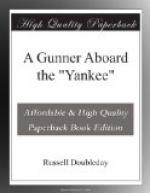The fortifications ashore had entirely ceased firing, and at ten o’clock a signal to stop bombarding appeared on the flagship. It was obeyed with reluctance, and it was evident the crews of the various ships were anxious and eager to continue. As the fleet drew off there was a puff of smoke in one corner of Punta Gorda battery and a shell whizzed over the “Massachusetts.” A second shot came from one of the earthworks, and still another from Punta Gorda; then the firing ceased again.
“Didn’t I tell you so?” quietly remarked Tommy. “The beggars ain’t licked yet.”
“But they got a taste of Uncle Sam’s strength,” said Flagg.
“And I’ll bet anything they haven’t enough whole guns left to equip one small fort,” added “Stump.”
“I heard the skipper say the destruction of life must be enormous,” spoke up the “Kid,” stopping on his way aft to deliver a message. “He watched the whole thing with his glass. He told ‘Mother Hubbub’ the moral effect was worth all the trouble.”
“That’s an expert opinion,” observed “Hay,” wiping off the breech of the gun. “Now you’ve had your little say, youngster, so just trot along.”
The fleet presently reached its former station several miles off shore, and the bombardment of Santiago was at an end.
No attempt was made to clean ship until late in the afternoon. The men were permitted to lie around decks and rest, smoke, and discuss the fight, which they did with exceeding interest. When dinner was piped at noon, the shrill call of the boatswain’s whistle was welcome music. A sea battle is a good appetizer.
About four o’clock in the afternoon the fleet was treated to a spectacle both novel and humorous. The little “Dolphin,” a gunboat of not fifteen hundred tons displacement, which was keeping guard close in shore, began to use her guns. A battery near the channel returned the fire, but the plucky little craft maintained her position, and from the series of rapid reports coming from her four-inch breechloaders and six-pounders, it was evident she had something important on hand.
The “Yankee” was signalled to run in to her assistance, but before we could reach a position, the “Dolphin” had accomplished her task. It was not until then that we discovered what she had been doing.
“May I never see home again if the gunboat hasn’t corralled a railway train in a cut!” exclaimed “Patt.” “Just look there, fellows. See that ridge of earth on the other side of the channel? Just under it is a track running into a cut and—”
“The ‘Dolphin’ has closed up both ends,” interrupted “Stump,” with a laugh. “She’s knocked down a pile of earth and debris on the track and the, train can’t get out. What a bully trick.”
Flagg produced a glass, and after a careful scrutiny reported that he could see part of the train lying on its side at the eastern end of the cut. He could also distinguish a number of bodies, and it was plain that the Spanish loss had been heavy. It was not until later that we learned the details, which were as follows:




